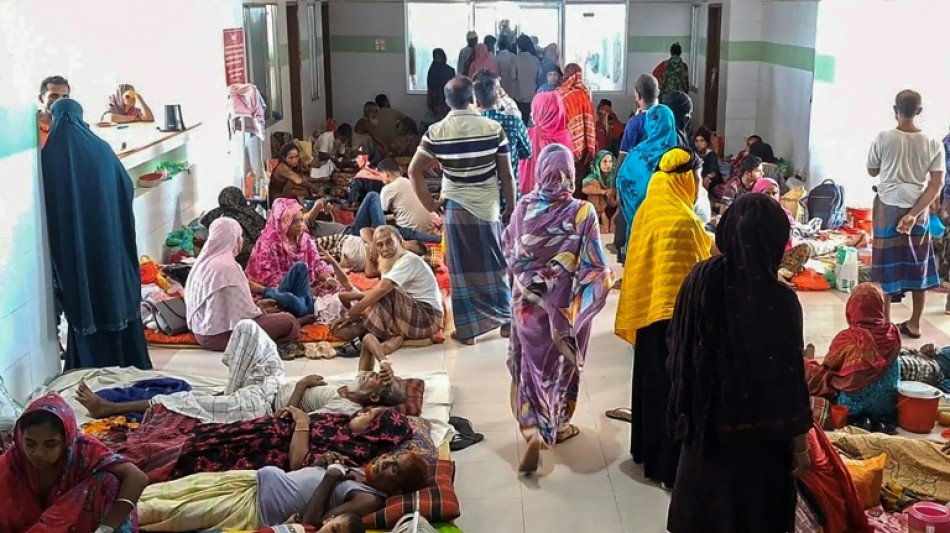
-
 Late Guirassy winner for Dortmund trims Bayern's lead atop Bundesliga
Late Guirassy winner for Dortmund trims Bayern's lead atop Bundesliga
-
'Free the mountains!": protest in Milan over Winter Olympics

-
 Gyokeres double helps Arsenal stretch Premier League lead
Gyokeres double helps Arsenal stretch Premier League lead
-
Six Nations misery for Townsend as Italy beat sorry Scotland

-
 Spain, Portugal face fresh storms, torrential rain
Spain, Portugal face fresh storms, torrential rain
-
Opinions of Zuckerberg hang over social media addiction trial jury selection

-
 Over 2,200 IS detainees transferred to Iraq from Syria: Iraqi official
Over 2,200 IS detainees transferred to Iraq from Syria: Iraqi official
-
Norway's Ruud tops Olympic men's freeski slopestyle qualifying

-
 Czech qualifier Bejlek claims first title in Abu Dhabi
Czech qualifier Bejlek claims first title in Abu Dhabi
-
French duo reach Shanghai, completing year-and-a-half walk

-
 Australian snowboarder James eyes elusive Olympic gold
Australian snowboarder James eyes elusive Olympic gold
-
Sequins and snow: Eva Adamczykova makes Olympic return

-
 Vonn set for Olympic medal bid after successful downhill training
Vonn set for Olympic medal bid after successful downhill training
-
Shepherd takes hat-trick as West Indies beat Scotland in T20 World Cup

-
 Sausages will sell after thrill-seeker Von Allmen wins Olympic downhill
Sausages will sell after thrill-seeker Von Allmen wins Olympic downhill
-
Swiss racer Von Allmen wins first gold of Winter Olympics

-
 'Wake up': Mum sparks comeback after scare for freeski star Gu
'Wake up': Mum sparks comeback after scare for freeski star Gu
-
Von Allmen wins men's Olympic downhill gold, first of Games

-
 First medals up for grabs at Winter Olympics
First medals up for grabs at Winter Olympics
-
Afghanistan captain Khan harbours dream of playing in Kabul

-
 Lindsey Vonn completes second Winter Olympics downhill training run
Lindsey Vonn completes second Winter Olympics downhill training run
-
Freeski star Gu survives major scare in Olympic slopestyle

-
 Iran FM looks to more nuclear talks, but warns US
Iran FM looks to more nuclear talks, but warns US
-
Hetmyer's six-hitting steers West Indies to 182-5 against Scotland

-
 After boos for Vance, IOC says it hopes for 'fair play'
After boos for Vance, IOC says it hopes for 'fair play'
-
Thousands gather as Pakistan buries victims of mosque suicide attack

-
 Lindsey Vonn completes second downhill training session
Lindsey Vonn completes second downhill training session
-
US pressing Ukraine and Russia to end war by June, Zelensky says

-
 Faheem blitz sees Pakistan avoid Netherlands shock at T20 World Cup
Faheem blitz sees Pakistan avoid Netherlands shock at T20 World Cup
-
Takaichi talks tough on immigration on eve of vote

-
 England's Salt passed fit for T20 World Cup opener
England's Salt passed fit for T20 World Cup opener
-
Spain, Portugal brace for fresh storm after flood deaths

-
 Pakistan bowl out Netherlands for 147 in T20 World Cup opener
Pakistan bowl out Netherlands for 147 in T20 World Cup opener
-
Pushed to margins, women vanish from Bangladesh's political arena

-
 Crypto firm accidentally sends $40 bn in bitcoin to users
Crypto firm accidentally sends $40 bn in bitcoin to users
-
Pistons end Knicks' NBA winning streak, Celtics edge Heat

-
 Funerals for victims of suicide blast at Islamabad mosque that killed at least 31
Funerals for victims of suicide blast at Islamabad mosque that killed at least 31
-
A tale of two villages: Cambodians lament Thailand's border gains

-
 Police identify suspect in disappearance of Australian boy
Police identify suspect in disappearance of Australian boy
-
Cuba adopts urgent measures to address energy crisis: minister

-
 Not-so-American football: the Super Bowl's overseas stars
Not-so-American football: the Super Bowl's overseas stars
-
Trump says US talks with Iran 'very good,' more negotiations expected

-
 Trump administration re-approves twice-banned pesticide
Trump administration re-approves twice-banned pesticide
-
Hisatsune leads Matsuyama at Phoenix Open as Scheffler makes cut

-
 Beyond the QBs: 5 Super Bowl players to watch
Beyond the QBs: 5 Super Bowl players to watch
-
Grass v artificial turf: Super Bowl players speak out

-
 Police warn Sydney protesters ahead of Israeli president's visit
Police warn Sydney protesters ahead of Israeli president's visit
-
Simi Khanna Launches Simi Beauty SK: A Natural Skincare Line Blending Luxury, Wellness, and Purpose

-
 Best Gold IRA Companies February 2026 Announced (Top Gold-backed IRA Companies Revealed)
Best Gold IRA Companies February 2026 Announced (Top Gold-backed IRA Companies Revealed)
-
Bolivia wants closer US ties, without alienating China: minister


Deadly dengue fever impacts climate-hit Bangladesh coast
Mosquito-borne dengue fever was rarely a major problem in Bangladesh's coastal districts, but some hospitals are so full of those with the potentially deadly virus that patients are treated on the floor.
As climate change drives erratic weather patterns, experts point to a dire lack of clean drinking water in the wider delta -- where the snaking Brahmaputra and Ganges rivers reach the sea -- as a likely driving force for the surge.
Rakibul Islam Rajan said his two-year-old daughter keeps searching for her mother, Azmeri Mona Lisa Zareen, who died of dengue in early June in the southern region of Barisal.
"Zareen developed high fever... her blood pressure collapsed -- and then she couldn't breathe," said 31-year-old Rajan.
"Our daughter keeps searching for her from one room to another".
In the worst cases, intense viral fevers trigger bleeding, internally or from the mouth and nose.
Barisal has recorded nearly half of the 7,500 dengue cases across Bangladesh this year, according to the Institute of Epidemiology, Disease Control and Research (IEDCR).
Five people have died there this year with dengue fever, out of 31 deaths recorded across the entire country of some 170 million people.
Numbers are still far below the deadly outbreak of 2023, when more than 1,700 people died across the South Asian nation, and more than 200,000 were infected.
In the Barisal district of Barguna, the hospital is packed full.
Barisal health chief Shyamol Krishna Mondal said it was the "worst we've seen".
Barguna's 250-bed public hospital was coping with more than 200 dengue patients.
"We couldn't even offer beds," Mondal said. "They are getting treatment while lying on the floor."
Kabirul Bashar, an expert on disease at Jahangirnagar University, said a lack of clean water was "one of the major reasons".
People store rainwater in containers, exactly the conditions mosquitoes love.
"The water distribution system is almost absent," Bashar said.
- 'Vulnerability is soaring' -
While a lack of clean water is a long-running problem, climate change is making it worse.
Rising seas driven by climate change threaten swathes of low-lying Bangladesh, with increasing numbers of powerful storms bringing seawater further inland, turning wells and lakes salty, according to government scientists.
Changing weather patterns, making once predictable rains uncertain, adds to the challenge -- with people storing rainwater when they can.
But Mushtuq Husain, a public health expert and adviser at IEDCR, said that the plentiful water storage pots also provided perfect mosquito breeding sites.
"We can't allow water stagnation anywhere -- that should be the rule of thumb, but it's not happening," he said.
"The vulnerability is soaring because of the high temperatures and erratic rainfall, which are conducive to mosquito breeding."
Bangladesh has recorded cases of dengue since the 1960s but documented its first outbreak of dengue haemorrhagic fever, a severe and sometimes fatal form of the disease, in 2000.
The World Health Organization (WHO) has warned that dengue and other mosquito-borne viruses are spreading faster and further due to climate change.
About half of the world's population is now at risk of dengue, with an estimated 100 to 400 million infections occurring each year, and many of those causing only mild illness, according to the WHO.
Rajan, mourning his wife, worries that there will be more deaths to come, accusing local authorities of failing to stem mosquitoes.
"Dengue has taken her," he said of his late wife. "I don't know how many more are in the queue... but I don't see enough cleanup activities."
M.Thompson--AMWN


